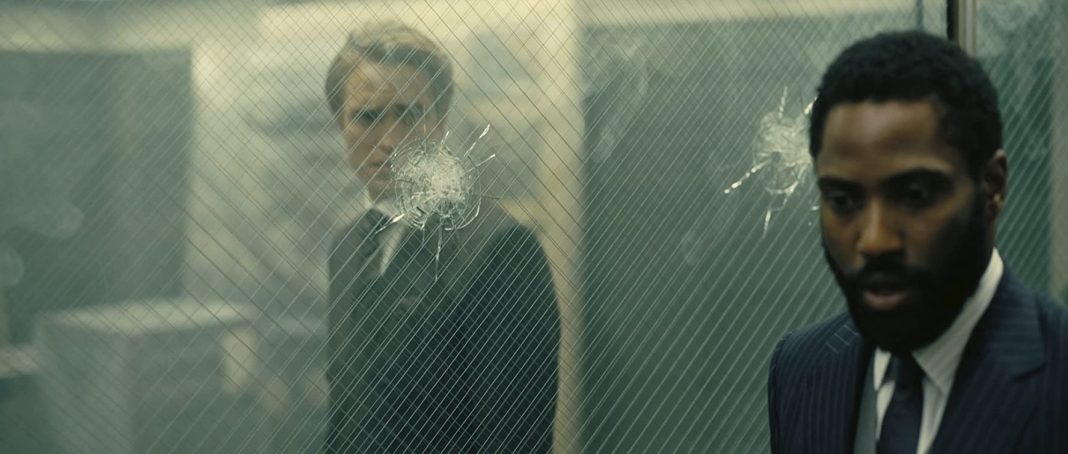Going into Tenet, I was most expecting it to mirror one of writer/director Christopher Nolan’s earlier efforts: Inception. Tenet has been marketed as a sort of James Bond-ish thriller with some complicated time warping elements mixed in, which is pretty much how I’ve (favorably) thought of Inception for all these years. But to my surprise, sometimes for better and sometimes for worse, Tenet feels a lot more like an even earlier Nolan film: Memento.
Tenet stars John David Washington as The Protagonist, an unnamed government agent working on an overseas strike team on a mission that goes wrong. The Protagonist is captured and tortured, but after refusing to give up his organization or colleagues, he is eventually recovered and rewarded for his loyalty with a promotion and a secret: Tenet. What is Tenet? It’s an organization that operates in the shadows, he’s told, and it’s a word that can open doors, but his handler can offer little more. His first objective is to meet with a weapons analyst for the organization, who introduces the film’s central idea: Tenet has been recovering bullets and weapons that have had their entropy reversed. This means the bullets appear, to us, to move backwards. How is this possible? Someone from the future has figured out a way to reverse these objects and send them backwards to us. Which begs the question: Who or what else are they sending backwards, and why?
To uncover more clues, The Protagonist starts a globetrotting journey, with a little help from a referred colleague, Neil (Robert Pattinson). The film’s first 30 minutes or so focuses on a chain of events that eventually leads him to an arms dealer named Sator (Kenneth Branagh) and his estranged wife, Kat (Elizabeth Debecki). The details of these events and the following 30 minutes play out like a typical Bond movie, with The Protagonist getting closer to Kat in order to glean information about Sator and how he is involved with Tenet. About halfway through the film, the timey-wimey elements start to pick up, and talking about anything after that point feels like a spoiler landmine.
At a broad level, the thematic underpinnings of Tenet are some of the most interesting Nolan has ever tackled. It examines the way point of view shapes our own narratives and experiences, and how humanity’s will to survive and to thrive – not as a collective species, but specifically the people we know and love in the here and now – is at once one of our biggest strengths and weaknesses. In some ways it stands as a thematic partner to Interstellar, which examines humanity’s will to continue as a species, regardless of the personal cost.
As far as performances go, everyone is firing on all cylinders, particularly Branagh. The film’s lead trio of Pattinson, Debecki, and Washington have a natural and easy chemistry that helps disarm some of the more difficult moments in Tenet, and the warmth they bring to the roles helps fill in the very broad shape of characters they’re working with on paper.
But Tenet is not without flaws. Nolan is one of my favorite directors, so I’ll preface this by saying that a mixed Nolan film is often higher on my list than a middle of the road film from anyone else. Tenet is an incredibly convoluted and difficult film: it contains many of the director’s trademarks, but to the extreme, which in some ways makes it feel more like work than play. For better or worse it’s the most Nolan movie one could conceive of, filled with unintelligible but seemingly important dialogue, thinly sketched characters, mind-blowing action sequences, and ideas that feel like they’ve been seen 1,000 times before but still manage to feel one-of-a-kind when played out on his own terms.
Difficult can mean different things for different people, and in some ways, as a friend pointed out to me, Nolan is given less latitude than more experimental or auteur directors along the lines of David Lynch and David Cronenberg simply because his films have always had a more broad appeal to start with. Nolan has an uncanny ability to make big, bold spectacles feel smart while still feeling incredibly grounded, and with Tenet, he’s officially moved away from the ‘grounded’ part of his blockbusters. I wouldn’t recommend a Cronenberg film to just anybody, while I’d recommend an Inception or Interstellar to just about anyone – they’re crowd-pleasers. I don’t expect Tenet will be hailed as a crowd-pleaser. It’s more of a head-scratcher.
In many ways it’s one of the most frustrating films I’ve seen in a long time, in part because a bit more clarity, rules, and world-building could have gone a long way in helping the end product match its own ambition. The ideas feel out of reach more due to execution than an impregnable, Lynchian vision. These issues reach a peak in the film’s third act, where what’s meant to be one of the most visually exciting climaxes falls flat. But it’s also a film I’ve been thinking out for hours after leaving the theater, a puzzle I’m still trying to unravel, partially because so many of the most interesting thematic elements are lurking beneath the surface, buried under mechanical questions about how we got from point A to point B. For me, so far, the only signature Nolan move that Tenet lacks is the moment where all of the pieces clicks into place in a satisfying or cathartic way, which is a moment I’m still searching for after a first viewing. But is that the intent?
Several characters in Tenet reference a temporal pincer move, which is a variation on the military strategy known as a pincer move, in which forces attack the enemy from both sides. In the case of the temporal iteration, a force is attacked from two sides of time using the reverse entropy described above. A person can go through an event, garner information about it, and then move through that same event, but inverted, with the extra knowledge she picked up the first time. It’s hard not to think that Tenet is telling you exactly how it needs to be watched – via pincer move – with a lot of confusion and chaos the first time around, hopefully illuminating your knowledge and approach on a second pass. Perhaps, like Memento, it’s a movie that you can enjoy differently a second time with a completely fresh perspective, armed with the knowledge from your first pass. Or maybe not. But I’m game for a second watch, if nothing else.








“Nolan is given less latitude than more experimental or auteur directors along the lines of David Lynch and David Cronenberg simply because his films have always had a more broad appeal to start with.”
Nolan’s films are also much more expensive than Lynch’s and Cronenberg’s films, which means they have to appeal to a large global audience. So they must have commercial elements such as action and special effects.
Nolan began as an art-house director with FOLLOWING and MEMENTO. He went commercial with INSOMNIA (his first major-studio film with real stars) and has stayed commercial ever since.
My main gripes about Nolan is that his films are too long, too humorless and self-important. He has that in common with Zack Snyder, but he’s rarely as ponderous as Snyder.
Good point, George! Gotta pay those bills. Do you plan to see this one?
I have to say, I thought of David Lynch when I walked out of the theater as well. The comparison was not favorable to Nolan, though. I have capital-L Loved a handful Nolan films, and the rest I’ve found to be good if sometimes overrated. However, I think that Tenet was just poorly done as a story. There are a lot of aspects that I thought were impressive – several visual contrivances were really cool, the score was nice, the array of location shots were uniformly beautiful – but the plot felt like it was confusing out of carelessness rather than a deliberately slow or sometimes twisted stream of information. Perhaps worse, while I think I ended up unraveling the plot on my own, I don’t think the effort was worth it. I didn’t get the sense that the movie came from any grand idea that Nolan was passionate about expressing; it felt like it came out of Nolan realizing that he had some ideas for cool visual devices and $250 million to make those ideas come to life. With Lynch, I am never confused by the plot or what I’m seeing or hearing on the screen but I think he does have some personal expression at the heart of all his films that may be hard to grasp, but which I feel is there nonetheless. Kind of the opposite for this movie, unfortunately.
On the director comparison front, it’s always funny to me to see fans compare him to Kubrick, (which I don’t think at all holds up, and is really pretty silly), whereas Nolan, just based on subject matter interests, populist approach and emotional heft surely sees himself more in the Spielberg vein.
Personally though, I’ve tended to compare him the most to Ridley Scott. A Ridley Scott who writes or co-writes his own screenplays, of course.
Agree with Kyle about the Ridley Scott comparison. Spielberg has more humor and warmth, and Nolan has yet to touch the depth or daring of Kubrick’s best films. I can’t see Nolan making anything like CLOCKWORK ORANGE … or BARRY LYNDON.
Nolan is respected because he’s one of the last people left making big studio films that are also good (most of the time). INTERSTELLAR put me to sleep, but DUNKIRK held my interest.
As to Hannah’s question … no, I won’t be seeing TENET in a theater. I went to a local theater to see Hitchcock’s NORTH BY NORTHWEST last month, but that was a special case. It was America’s No. 1 movie on the day I was born (in 1959).
I’m lobbying the theater to show RIO BRAVO, too …
Just saw the film at a drive-in movie theater this weekend (Becky’s in Pennsylvania, I recommend it) and I’m pretty much where this review is. It was one of those interesting experiment films where the director clearly was trying something, but somehow fell short.
It was interesting, it was enjoyable, but it wasn’t satisfying. I watch a lot of fantasy, I’m fine with “a wizard did it”, but Tenet was so internally inconsistent and incomprehensible that I had to keep reminding myself to turn off my brain. The actors all did a fine job, but Nolan gave them far less to work with than in Inception or his Batman films. He can build characters and relationships to give a film heart, but aside from the three lead actors working double-time to do the best they could with what threads of interaction he gave them, it wasn’t there. It felt like Nolan was so busy trying to figure out his Inversion mcguffin that he forgot to give us a reason to care.
I’m glad I saw it, but I have no reason to see it again, unlike other Nolan films. Still, it was an interesting experiment, entertaining, and proves he isn’t ossifying into making the same movie over and over again, so I feel like it isn’t a bad sign for his film career.
Comments are closed.